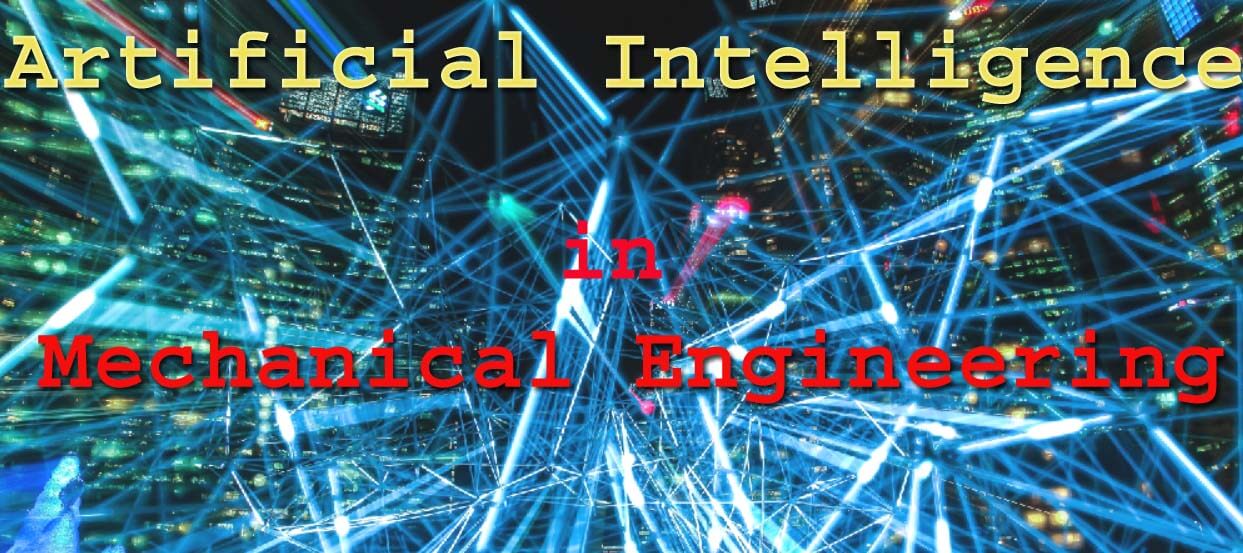AI in Mechanical Engineering
Mechanical engineering, the backbone of modern industry, is witnessing a profound transformation with the infusion of Artificial Intelligence (AI) technologies. AI is revolutionizing how mechanical engineers design, analyze, and optimize systems, pushing the boundaries of efficiency, precision, and innovation. Let us explore the myriad applications, advantages, and implications of AI in the realm of mechanical engineering.

Applications of AI in Mechanical Engineering
- Design Optimization: AI employs generative algorithms to explore design possibilities and present efficient solutions.
- Computer-Aided Design (CAD): AI automates tasks like part modelling and drafting, streamlining the design process.
- Finite Element Analysis (FEA): AI speeds up simulations, optimizing mesh generation and analysis setup.
- Predictive Maintenance: AI predicts maintenance needs, minimizing downtime and extending equipment life.
- Manufacturing Automation: AI enhances precision and efficiency in assembly, welding, and quality control.
- Quality Control: AI-driven visual inspection reduces defects and the need for rework.
- Process Optimization: AI fine-tunes manufacturing processes in real time for improved product quality and energy efficiency.
- Supply Chain Management: AI optimizes inventory, predicts demand, and streamlines logistics for cost and lead time reduction.
- Materials Research: AI analyzes datasets to identify new materials with specific properties.
- Energy Efficiency: AI optimizes HVAC systems in manufacturing facilities for energy savings.
- Design Verification: AI automates compliance with safety and regulatory standards.
- Robotics and Automation: AI powers robotic systems for precision tasks.
- Simulation and Modeling: AI enhances accuracy in analyzing complex mechanical systems and processes.
- Collaborative Robots (Cobots): AI-driven Cobots work alongside human operators.
- Data Analytics: AI provides insights into manufacturing processes, product performance, and customer feedback.
- 3D Printing: AI optimizes printing parameters, reducing defects and increasing speed.
Related: 7 Strategies to Find Topics and Choose the Best One
Advantages of AI in Mechanical Engineering
- Efficiency: AI accelerates design and analysis processes, reducing time-to-market for products and systems.
- Precision: AI algorithms can perform intricate calculations and analyses with high accuracy, minimizing errors in design and manufacturing.
- Cost Reduction: Predictive maintenance and automation reduce maintenance costs and minimize downtime, leading to cost savings.
- Innovation: AI-driven design tools can explore unconventional solutions that human engineers might overlook, fostering innovation.
- Safety: Automation and robotics enhance workplace safety by handling dangerous tasks and reducing the risk of accidents.
Implications and Future Trends
The integration of AI in mechanical engineering raises various implications. Engineers need to adapt to these technologies and acquire AI skills. Additionally, ethical concerns about AI decision-making, privacy, and data security must be addressed.
Several trends are expected to shape AI in mechanical engineering, including increased use of AI in generative design, more advanced robotics, further development of digital twins (virtual replicas of physical systems), and the incorporation of AI in additive manufacturing (3D printing) processes.
In conclusion, AI is reshaping the landscape of mechanical engineering by enhancing efficiency, precision, and innovation across various domains. Mechanical engineers who harness the power of AI will be better positioned to navigate the complexities of modern industry, drive innovation, and contribute to the development of sustainable and technologically advanced systems and products.
Artificial Intelligence – Related Articles (Collegelib)
- Artificial Intelligence (AI)
- AI Seminar Topics collection
- AI Seminar Topics – Computer Science
- 10 Books on AI (Artificial Intelligence)
Collegelib.com prepared and published this curated seminar topic ideas for Engineering students. Before shortlisting your topic, you should do your research in addition to this information. Please include Reference: Collegelib.com and link back to Collegelib in your work.
FAQs
What is Artificial Intelligence?
Artificial Intelligence (AI) is the simulation of human intelligence in machines, particularly computer systems. AI enables machines to perform tasks that typically require human intelligence, such as problem-solving, learning from experience, recognizing patterns, understanding natural language, and making decisions. AI systems use algorithms and data to analyze information, adapt to new situations, and improve their performance over time. They can be classified into two main categories: narrow or weak AI, designed for specific tasks, and general or strong AI, which possesses human-like intelligence across a wide range of tasks. AI has many applications, including natural language processing, machine learning, computer vision, robotics, autonomous vehicles, healthcare, finance, and more. It is a transformative technology with profound implications for various industries and everyday life.
What is 3D Printing?
3D printing, also known as additive manufacturing, is a revolutionary technology that creates three-dimensional objects layer by layer from digital designs. It operates by depositing material, often plastic, metal, or resin, in precise layers following a computer-generated blueprint. This process allows for the production of intricate and customized objects, ranging from prototypes and medical implants to architectural models and food. 3D printing offers numerous advantages, including rapid prototyping, reduced waste, and the ability to produce complex geometries that traditional manufacturing methods may struggle to achieve. It has transformative potential across industries, from healthcare and aerospace to automotive and consumer goods, ushering in an era of decentralized and on-demand production.
This article was initially published on Collegelib in 2023.